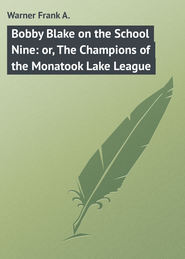По всем вопросам обращайтесь на: info@litportal.ru
(©) 2003-2024.
✖
Bobby Blake on a Plantation: or, Lost in the Great Swamp
Автор
Год написания книги
2017
Настройки чтения
Размер шрифта
Высота строк
Поля
“Not as loud as some poor fish that I know of,” retorted Lee.
“Wow!” exclaimed Bobby, laughing. “That had all the earmarks of a dig, Lee.”
Fred opened his mouth to make a cutting remark, but at that moment his reel whizzed, and for the next five minutes he was too busy to say a word. The fish fought gamely, and the frail rod at times bent almost double and threatened to snap. But at last Fred landed the gleaming fish on the grass.
“Good work!” applauded Lee. “After that I take back my unkind words, Fred.”
“That’s all right,” said Fred, “nothing could make me mad now. Isn’t that fish a beauty? I’ll bet he weighs all of three pounds.”
“Wouldn’t be surprised,” assented Bobby. “Two or three more like that, and we can have a feast.”
But the required number failed to materialize, and after half an hour of patient angling, the boys decided to try their luck in a new location. Accordingly they moved some two or three hundred yards further upstream, and cast again. Here the fish were biting better, and in a little while even Lee had caught a fair sized fish, while Bobby and Fred each had two to their credit. Content with this haul, they decided to go back to the boat and continue their journey. They strung the fish on a bit of line, and then made their way back to where they had left the craft.
But the motor boat was nowhere to be seen!
For a moment all three were too surprised to speak. Bobby was the first to break the dazed silence.
“It looks as though we were up against it, fellows,” he said, soberly. “How do you suppose that boat got away, anyway?”
“It must be we didn’t pull it up far enough,” said Lee, “although I didn’t think the current was strong enough here to float a chip away. But now it looks as though I made a bad mistake.”
“I don’t think there is any mistake about this,” said Bobby, who had been doing some quick thinking. “That boat would never have floated away unless somebody had helped it to. We had it drawn up too far for that.”
“But who in the world would there be here to set it adrift?” inquired Lee, in bewilderment.
As though in answer to his question, there was a sudden stir and rustle in a tall bunch of swamp grass in back of them, and as they whirled about they saw a young negro boy leap from the grass and start running as fast as his legs could carry him.
“After him, fellows!” yelled Bobby, and the three comrades took after the negro at top speed. The latter was fleet, but he was no match for Bobby who soon outdistanced his companions and was close on the negro’s heels. The darkey, hearing the pursuit so close to him, suddenly turned, and Bobby thought for a second that he was going to show fight, but instead he fell on his knees and started to beg for mercy.
“D – don’t hit me, white boy,” he stammered. “Ah was made to do it, ’deed Ah was.”
“Do what?” asked Bobby. “I haven’t accused you of doing anything yet.”
“Nossuh, you hasn’t, and Ah wouldn’t have shoved off dat boat, neider, if mah boss hadn’t done tole me he’d skin me alive if Ah didn’t.”
“I know this coon,” said Lee, who with Fred came up panting at this juncture. “He works for Jim Boolus, and I reckon that explains how our boat came to get adrift. How did you know we were here?” he continued, addressing the negro.
“Ah was rowin’ Marse Boolus down de ribber,” answered the darkey, “an’ fust thing Ah knows he spies you-all’s boat wid its nose stuck up on de mud bank. ‘Dat’s de Cartiers’ motor boat,’ he says to me, gettin’ all excited. ‘Suppose young Cartier and dose fresh friends o’ his’n must be aroun’ somewhere!’”
“‘Yessuh,’ Ah says, and keeps right on rowin’. But we hadn’t gone no distance ’tall when he tells me to quit.”
“‘Gimme dem oars, you fool nigger,’ he says, ‘Ah’ll row dis boat in, and Ah wants you should step ashore an’ heave dat boat off de bank.’”
“Ah jes’ had to do like he says, ’cause Marse Boolus is a powerful mean man when he gits riled. But Ah hadn’t any more dan got ashore when he hears one of you white boys shoutin’ somethin’, an’ he thinks you’re comin’ back for your boat. Wid dat he starts pullin’ away like mad, leavin’ me up on de bank. Ah shoved off de boat, anyway, thinkin’ dat he’d come back an’ pick me up, but he jes’ kep’ right on goin’, and here I is.”
“We ought to pitch you into the river and let you swim after him,” said Lee, angrily.
The frightened negro rolled his eyes. “Ah’s sorry, boss,” he whimpered, “but Marse Boolus would jest as soon land me wid an oar as not if Ah didn’t do what he tole me to.”
“It’s no use bothering with him,” said Bobby. “The damage is done now, and we’ll have to try to get out of this mess some way.”
“I suppose Boolus is chuckling now to think how he’s got even with us,” said Fred, clenching his fists. “I wish now he’d fallen out of that buggy onto some nice hard rocks instead of into soft sand.”
“Well we’re in a pretty pickle, anyway,” said Lee, as the full extent of the calamity began to dawn on him. “We’re somewhere about the middle of the swamp, without any way to get out unless we swim, and no provisions except a few fish.”
“Oh, it may not be quite as bad as that,” said Bobby. “How do you know there’s no way out except by the river? There’s probably some path through, if we can only find it.”
“Yes, but that’s a big if,” said Lee. “But I guess we might as well go back and get those fish and cook them. We’ll have to camp out to-night, anyway, and then see what we can do in the morning.”
As nobody could suggest anything better than this, they made their way back to the river, taking the negro with them. “There’s no knowing what he’ll be up to,” said Lee. “We’d better keep an eye on him.”
They cleaned and cooked the fish, and ate them in silence, each one busy with his own thoughts. The flat and dreary swamp spread out on all sides of their camp, except that bounded by the river. As evening came on, a cold white mist arose from the morass, causing them to shiver and throw more wood on their fire. Fortunately there was a plentiful supply of driftwood along the shore, and they resolved to keep the fire going all night, each one taking a turn at standing watch and putting fresh fuel on. As twilight deepened into night, strange noises arose on every side; the croaking of frogs, the weird calling of water fowl, and above all the fierce hum of mosquitoes that came in clouds to add to the discomfort of their situation.
“Where’s that darkey?” exclaimed Lee suddenly.
They had momentarily forgotten him, and now, when they looked around, there was no sign of him. He had disappeared into the surrounding blackness, and the boys knew that it would be hopeless to look for him.
“It’s just as well, anyway,” said Fred. “He had a treacherous look in his eyes, and I feel better now that he’s not around.”
“Yes, but the chances are he knew of a way out of this place,” said Lee, “and we might have made him show it to us. But he’s gone, and there’s no use worrying about it, I suppose.”
“Well, if he can get out, we can, too,” said Bobby, hopefully. “We’ll get a start as soon as it’s light enough to see, and maybe we’ll be home in time for lunch.”
CHAPTER XIX
IN DESPERATE PERIL
Bobby stood the first watch, Fred the second, and Lee the last. Nothing of any importance occurred during the night, although the swamp all around them seemed teeming with life. Above the croaking of frogs and the hum of night insects there rose at times a strange bellowing noise, that sent shivers creeping over Bobby and Fred, and which they were at a loss to explain. But next morning Lee told them the source of the strange noise.
“What you heard were alligators,” said Lee. “There are lots of them in this swamp, and we’ve got to look out for them. They’re pretty fierce, and they’ll attack anything under the sun.”
“Gee!” said Bobby, “if I had known that, I think I’d have spent the night up a tree. I could hear one pretty close while I was keeping the fire going, too.”
“Probably he was attracted by the light of the fire,” said Lee. “But I don’t think they’d bother any one on land, as a rule. But they’ll tackle anything in the water, and if they once get a grip with those pointed teeth of theirs, its all over for the one that’s caught. The alligator just drags him down under the surface, waits until he’s drowned and then drags him up on the nearest sandbank and swallows him at his leisure.”
“That’s fine – for the alligator,” muttered Fred, with a slight shiver which was not all the result of the clinging mist. “I don’t think I’ll do much swimming while we’re in this swamp.”
“I’d advise you not to,” said Lee. “I sure hate ’gators, but just the same I wouldn’t mind finding a few of their eggs for breakfast.”
“Eggs!” exclaimed Bobby and Fred together.
“Certainly,” said Lee, laughing at their amazed look. “I don’t care for them much as a rule, but one or two now wouldn’t be half bad.”
“Good-night!” exclaimed Fred. “What do they taste like, anyway?”
“Oh, they’re not so bad. They have a rather unpleasant musky taste, but if you’re hungry enough you don’t mind that. The darkeys think they’re fine, and spend a lot of time hunting them out.”
“Where do you find the eggs?” inquired Fred.







